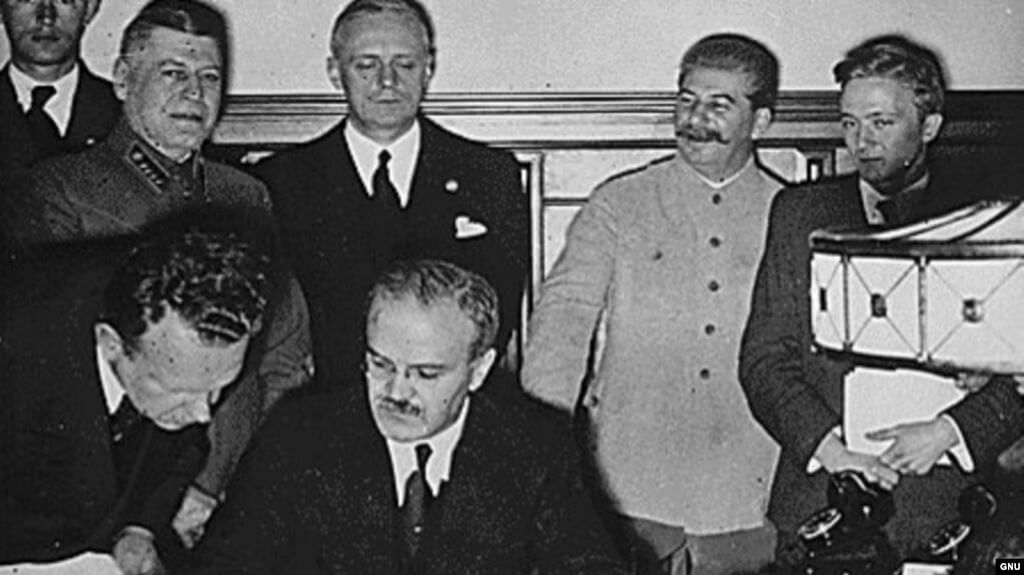Lubomyr Luciuk, Kingston, ON.
Not many remember what happened 80 years ago, this week. Worse, we live in a world populated by scores of propagandists doing their darndest to pretend nothing much did. These shills are more than duplicitous. They are dangerous. For they are trying to rewrite the history of the Second World War, to obfuscate not just the dates on which the war began, and ended, but to confound us about who the villains were.
Eighty years ago, on 23 August 1939, the Soviet Union allied itself with Nazi Germany under the terms of the Molotov-Ribbentrop Pact. The Second World War began on 1 September 1939 as Hitler and Stalin dismembered Poland.
This pact succoured the German war effort, undercutting Britain’s blockade. A million tons of cereals, half a million tons of wheat, 900,000 tons of oil, 100,000 tons of cotton, 500,000 tons of phosphates, a million tons of soybeans, and other matériel, were shipped to the Nazis by the Soviets during the pact’s first year. And, after Nazi Germany signed a Tripartite Pact with Imperial Japan and Mussolini’s fascist Italy, in September 1940, the Soviets considered joining a “continental bloc” opposed to Britain and the USA. The scheme collapsed only in November 1940 after it became clear in Berlin just how far Moscow hoped to extend Soviet influence in Europe. Hitler’s ensuing invasion of Stalin’s domains began on 22 June 1941.
That is the date the Soviets, and contemporary Russian apologists, want us to think of when they speak about a “Great Patriotic War.” Proponents of this bowdlerized version of history apparently hope we shall forget how, as of 10 September 1939, Canada committed to securing vital supply lines for our embattled British ally. During what would become the war’s longest-running campaign, the Battle of the Atlantic, the Germans countered Canadian efforts by deploying deadly submarine “wolf packs.” To take one example: Convoy SC-7, comprised of 35 merchant ships and 6 escorts, set sail on 18 October 1940 from Sydney, Nova Scotia, bound for Liverpool. Twenty of those merchant ships were sunk during a 3-day battle, with some 140 sailors losing their lives. Overall, the Royal Canadian Navy lost nearly 2,000 sailors and 33 ships, the Royal Canadian Air Force more than 900 aircrew, and the Merchant Navy nearly 1,600 Canadians and Newfoundlanders and some 70 ships.
And when, in mid-summer 1940, the Battle of Britain raged, Canadian pilots rose up to fight the foe. Prime Minister Winston Churchill’s words, spoken in the House of Commons, 20 August 1940, still evoke their heroism: “The gratitude of every home in our island, in our Empire and indeed throughout the world, except in the abodes of the guilty, goes out to the British airmen who, undaunted by odds, unwearied in their constant challenge and mortal danger, are turning the tide of the world war by their prowess and their devotion. Never in the field of human conflict was so much owed by so many to so few.” By October 1940, twenty-three Canadians had been killed in the skies over England, including RCAF Squadron No. 501’s Pilot Officer D. A. Hewitt. From St John, New Brunswick he was Canada’s first casualty, just 20 years old when shot down over Dorset, 12 July 1940, a lad with no known grave. And then there was Pilot Officer C. R. Bonseigneur from Gull Lake, Saskatchewan, who fell on 3 September and Sub-Lieutenant J. C. Carpenter, of Toronto, killed in action on 8 September 1940. On 25 August 1940 the Royal Air Force retaliated with its first bombing raid on Berlin. Two Canadians were among the crews serving on the 95 aircraft striking the Third Reich – Kingston’s own Flight Lieutenant D. L . England (No. 61 Squadron) and Flying Officer M.M. Fleming, from Ottawa, serving with No. 58 Squadron. As these men fought, and many would die, none of them spoke of a “Great Patriotic War.” Should we pretend otherwise? Or forget how, while France and the Low Countries were overrun by Hitler’s hordes, and the doors to hell opened at Auschwitz, Stalin was helping Hitler?
No fair-minded person denies the Soviet Union eventually played a major role in helping defeat the Nazis. Most Soviet civilian losses occurred in Ukraine and Belarus, giving the lie to claims about there being “27 million Russian war dead,” since most of them were not Russians. Certainly all who suffered under Nazi oppression deserve to be hallowed. But we must not forget the Soviet Union was not our ally when the Second World War began. On that date Stalin stood with Hitler, and that means, simply put, the Soviets were ranked against us.
As Canadians we honour those who stood in defence of liberty from the day the war began and those who fought to its end, 8 May 1945. But, as we do so, we must never forget that Moscow’s men not only fuelled the Second World War but joined our side only after the holocaust they had stoked began to burn their empire down. Let us not forget that, at least not today.
Lubomyr Luciuk is a professor of political geography at The Royal Military College of Canada
Share on Social Media


































